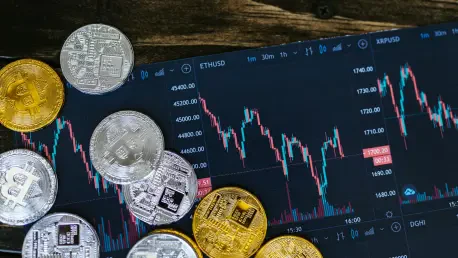Setting the Stage for a Financial Revolution
Imagine a world where traditional stock markets are no longer confined to rigid trading hours or high entry barriers, but instead, equities flow seamlessly across a decentralized, global network accessible to anyone with an internet connection. This scenario is rapidly becoming reality with the rise of xStocks, a trailblazing platform for tokenized equities built on the Solana blockchain. Launched on June 30 of this year, xStocks has already reshaped the decentralized finance (DeFi) landscape by offering over 55 tokenized stocks and ETFs, bridging the gap between conventional finance and digital innovation. This market analysis delves into the trends, data, and projections surrounding xStocks, exploring how it is driving a transformative shift in equity trading. The purpose is to uncover the forces behind its meteoric rise and assess the broader implications for investors and the financial sector at large.
Deep Dive into Market Trends and Data
Tokenized Equities: A Rising Force in DeFi
The concept of tokenized equities—converting real-world assets like stocks into digital tokens on a blockchain—has gained significant traction over recent years, fueled by the promise of democratized access and enhanced liquidity. Solana, with its high-throughput and low-cost transactions, has emerged as a leading blockchain for such innovations, addressing earlier challenges faced on slower networks like Ethereum. xStocks capitalizes on this infrastructure, enabling near-instant trades and fractional ownership of assets like AAPLx and TSLAx, which were once out of reach for many retail investors. Market data reveals a staggering adoption rate, with trading volumes surpassing $300 million in the first month of xStocks’ operation, highlighting a robust demand for these digital assets.
Unpacking xStocks’ Market Performance
A closer examination of xStocks’ performance paints a picture of unprecedented growth within the DeFi space. By the sixth week post-launch, trading volumes skyrocketed to over $2.1 billion, with on-chain decentralized exchange (DEX) activity contributing more than $110 million. This rapid escalation reflects a growing preference among DeFi users for the transparency and flexibility that tokenized equities offer compared to traditional markets. The platform’s accessibility across 185 countries, facilitated by strategic partnerships with centralized exchanges like Kraken and Bybit, further amplifies its market penetration. However, volatility remains a concern, as sharp fluctuations in digital asset markets could impact investor confidence if not managed effectively.
Strategic Alliances as Growth Catalysts
Behind xStocks’ impressive figures lies a powerful collaborative framework known as the xStocks Alliance, which includes key players such as Backed, Solana, Chainlink, and DeFi platforms like Raydium and Jupiter. These partnerships not only enhance liquidity through integrations with Raydium but also optimize trading efficiency via Jupiter’s quote aggregation. Additionally, wallet providers like Phantom and Solflare ensure user-friendly access to xStock tickers alongside other tokens, broadening the platform’s appeal. While this alliance model accelerates global reach, it also introduces complexities in aligning diverse operational goals and maintaining seamless interoperability across systems, a factor that could shape long-term scalability.
Future Projections for Tokenized Equities on Solana
Scaling Up: Technological and Market Potential
Looking ahead, the trajectory for tokenized equities on Solana appears poised for significant expansion, driven by technological advancements and increasing investor interest. Projections suggest that platforms like xStocks could see trading volumes rivaling traditional equity markets by 2030, provided blockchain scalability continues to improve. Solana’s ongoing upgrades to handle higher transaction throughput will likely play a critical role in supporting this growth. Moreover, the integration of real-world assets into DeFi is expected to attract institutional investors, further legitimizing the space, though education on tokenized assets will be essential to onboard less tech-savvy participants.
Regulatory and Economic Influences on the Horizon
Regulatory developments represent a pivotal factor in the future of tokenized equities, with some regions crafting supportive frameworks while others remain cautious about DeFi’s decentralized nature. Economic trends, such as a rising demand for alternative investment vehicles amid global market uncertainty, could propel platforms like xStocks to new heights. Forecasts indicate that from this year to 2027, the market for tokenized assets might grow at a compound annual rate exceeding 25%, assuming regulatory clarity emerges. However, potential hurdles like smart contract vulnerabilities or geopolitical shifts could temper this optimism if not addressed proactively.
Innovative Features Shaping Competitive Edge
xStocks stands out with unique DeFi integrations that could redefine competitive dynamics in the market. Features such as collateral pools for leveraged positions through Kamino allow users to amplify exposure to tokenized stocks, a mechanism unavailable in conventional finance. These innovations cater to a global audience but face challenges in regions with stringent financial oversight, where acceptance of such tools varies widely. Industry insights suggest that addressing misconceptions about DeFi’s complexity and enhancing security protocols could solidify xStocks’ position as a market leader, potentially setting a benchmark for future platforms in this niche.
Reflecting on Insights and Strategic Pathways
Looking back, the analysis of xStocks’ meteoric rise revealed a transformative force in the financial sector, underscored by trading volumes reaching $2.1 billion within weeks and a strategic alliance model that spanned 185 countries. The platform’s success on Solana highlighted the immense potential of tokenized equities to disrupt traditional markets through liquidity and accessibility. Moving forward, stakeholders should prioritize monitoring regulatory shifts to mitigate compliance risks and invest in robust security measures to safeguard against digital vulnerabilities. Businesses in fintech might consider forging partnerships with DeFi platforms to capture this burgeoning market, while investors could explore fractional ownership opportunities on xStocks to diversify portfolios. Ultimately, staying agile and informed in this dynamic landscape emerged as the key to leveraging the next wave of financial innovation.









